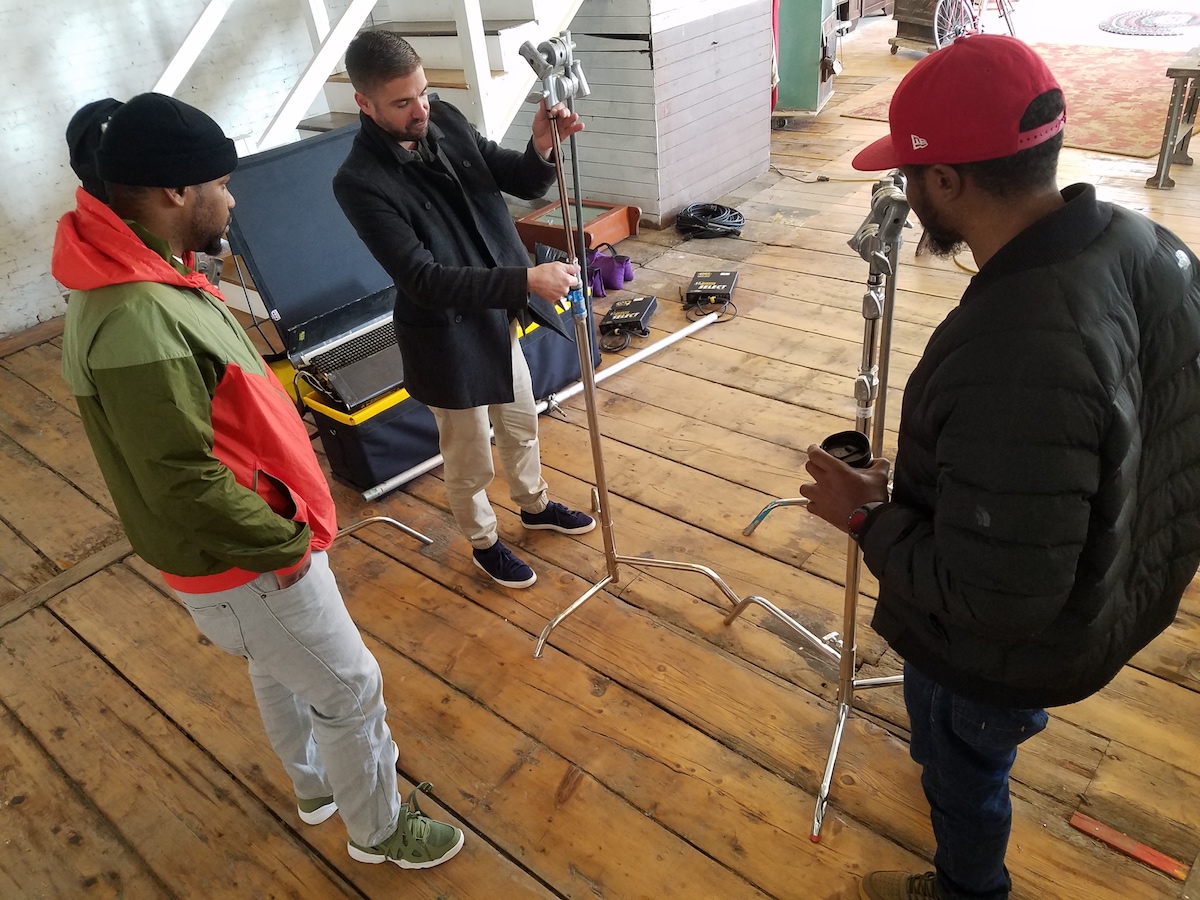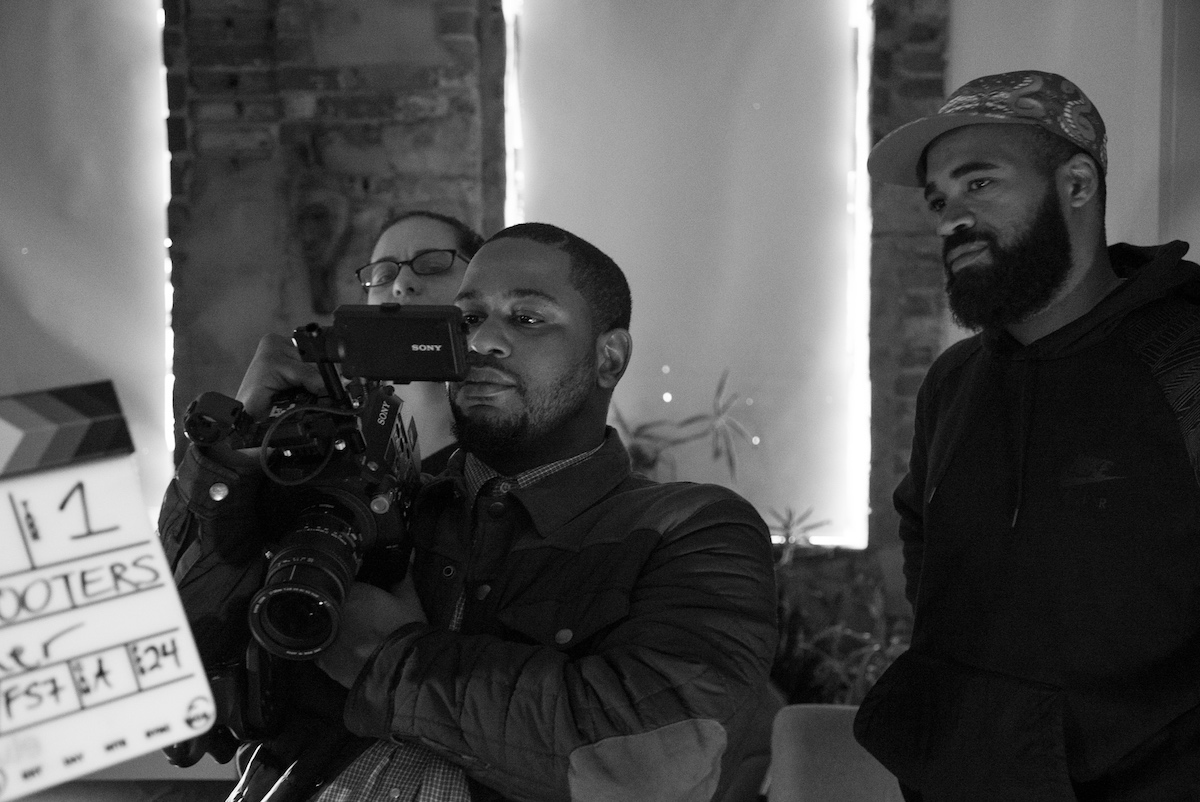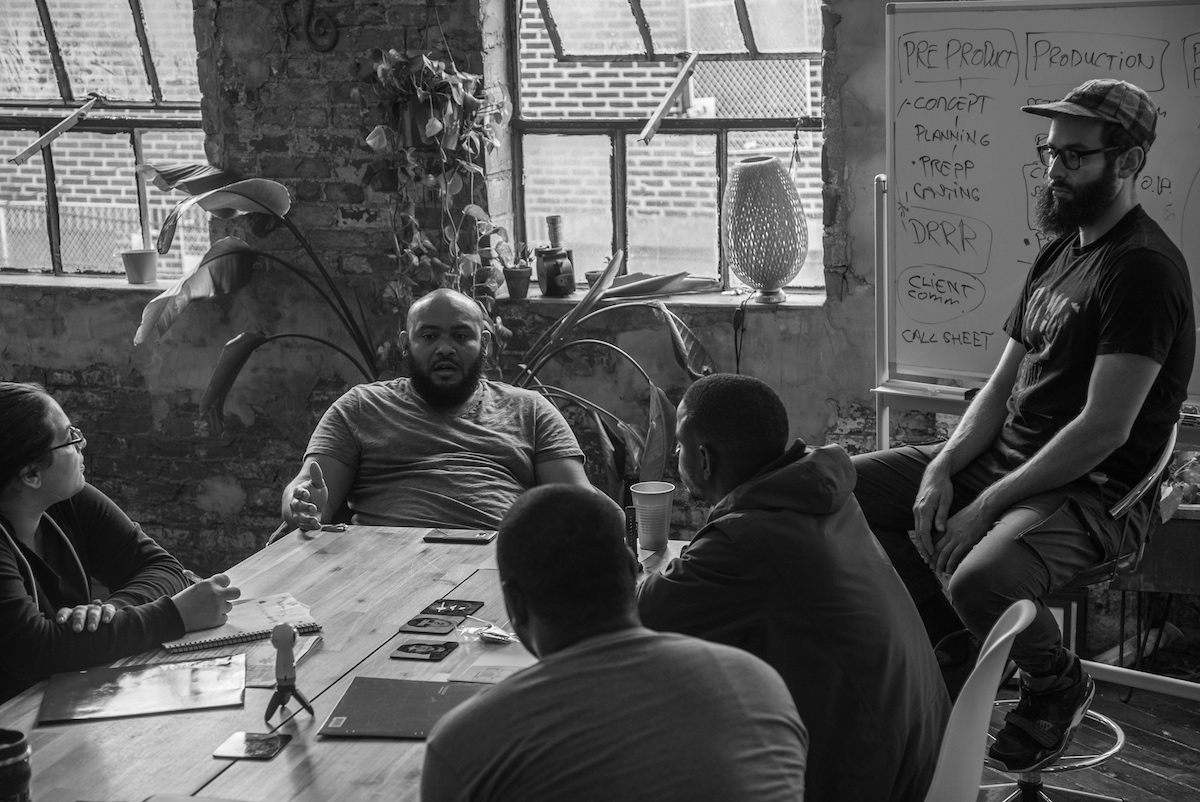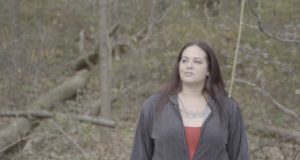At SHOOTERS, the formerly incarcerated find freedom through film
 December 5, 2017
Category: Feature, Featured, Long, Purpose
December 5, 2017
Category: Feature, Featured, Long, Purpose
El Sawyer is done with talk. When it comes to representation of returning citizens, it’s time for action.
“When we talk about reentry, social justice and criminal justice, there are a lot of people talking at people, about people or presenting the population, but the population isn’t even at the table,” said the Media in Neighborhoods Group (MING) cofounder. “Given a skill set and a reason to actually meet people, it gives the population the ability to be at the table and be respected.”
Sawyer and his MING cofounder, Jon Kaufman, are at the tail end of the first official SHOOTERS cohort, a Knight Foundation-funded program that equips the formerly incarcerated with digital media and entrepreneurial skills while exposing them to working media professionals, politicians and other movers and shakers.
In addition to being paid for their time, cohort members will leave the program with employable digital media skills because it’s especially difficult for returning citizens to find employment upon reentry.
Sawyer knows. He said he felt obligated to teach after being incarcerated for eight years. While still in prison, he had the opportunity to be trained in film production and saw the necessity in sharing his new found knowledge.
After coming home in 2003, Sawyer began teaching others the art of digital media while working at the Village of Arts and Humanities, the nonprofit community center located in the heart of North Philly. Around this time Sawyer met Kaufman who was then studying at Temple University, and the pair began creating films together.
The SHOOTERS pilot program that originally occurred in 2014 was financially sustained by Sawyer and Kauffman, and they saw a necessity to keep it afloat.
“We didn’t have any funding and kind of did it off the skin of our backs and it was really successful,” said Kaufman. “We saw the impact of giving folks a platform and incubating them with storytelling and just digital skills.”
After securing funding from Knight, MING was able to develop robust programing for four individuals: Cohort members Russell Craig, Lindsey Massarelli, Khyan Walker and Richard Patterson have been able to write, film, direct and edit one-minute films about their lives over the past six weeks, as well as the films of their peers.
In addition to filming, cohort members were also given the opportunity to go on site visits to places like the Institute of Contemporary Art and Pipeline Philly. Members were also able to meet with filmmaker Glenn Holsten and criminal lawyer Shaka Johnson.
“Every site visit was inspirational it was refreshing to learn new stuff,” Craig said. “They are introducing me to new things — but there is a similarity between film and what I do.”
Craig, who is also a visual artist, has been painting for over 10 years and currently teaches at the Mural Arts program. He’s been using the skills learned at SHOOTERS to create time lapse videos of his artwork.
Craig’s one-minute film discusses the post-traumatic stress disorder that he has suffered from since leaving prison. His final film will relate his PTSD to the safety he feels while sitting in the back of the bus while riding SEPTA.

Khyan Walker, Seven Halsema and Russell Craig Setting up lighting for Richard Patterson’s video shoot. (Courtesy photo)
Massarelli is the only woman in the program. She also stands out because prior to SHOOTERS, her only experience with media making came from a few photography classes she took while in high school. What Massarelli didn’t have in technical skills, she made up for with drive and passion, Kaufman said.
“There is something there that we noticed — the unspoken drive or skill that you need to do this kind of work,” he said. “It is way more than cameras and editing and she had this curiosity and ability to talk to people, and an interest in talking to people.”
While incarcerated, Massarelli was unable to contact her son. In her film, she draws from this experience: While lost in the woods, her character receives a letter from her son that allows her to find her way out.
After her time at SHOOTERS ends, Massarelli plans to take classes at PhillyCAM with the hopes to advance her digital media skills and to tell the stories of formerly incarcerated women.
“There are so many women that have to get relationships with their children back, family and work. If you go to jail and just get out, as a guy, you can you can go get landscaping or construction [jobs],” Massarelli said. “We don’t really have that option.”
Walker and Kaufman met four years ago while shooting photography at the same event. Walker, who was new to photography, saw Kaufman with a more advanced camera, decided to introduce himself and ask Kaufman for photography and editing tips. At the time, Kaufman was only able to provide him with minimal resources. Years later while Sawyer and Kaufman were putting together the current SHOOTERS cohort, Kaufman reached out to Walker to invite him to join.
In his one-minute film, Walker explores his splintered family with images of loved ones and his incarceration as well as poetry.
Although Walker had experience with photography and shooting music videos for local underground rappers, he was able to find the value in being a part of SHOOTERS.
“I needed to work with a team,” Walker said. “I had beginner-stage knowledge — that wasn’t enough — and the fact that you got people out here that are willing to show you things, that’s important.”

Lindsey Massarelli, Khyan Walker and guest teacher Rashid Zakat on set for Walker’s video shoot. (Courtesy photo)
After participating in the SHOOTERS pilot program in 2014, Patterson continued to shoot footage around his neighborhood. Oftentimes Patterson would film himself on the block playing chess with other community members. Chess plays a large role in Patterson’s life — so much so that the game found its way into his film, where he depicts himself playing chess with himself.
“To me, chess represents life,” Patterson said. “As far as any moves you make, there can be a downside to it or an upside to it, but you got to really calculate your moves.”
After participating in both iterations of SHOOTERS, Patterson received contracted work with the Village and Revolt TV.
Those fruits of Patterson’s labor are what Sawyer and Kaufman hope to duplicate with other members and future cohorts. They believe their program can be copied and retooled with different media to ensure continued opportunities for the formerly incarcerated.
“We can germinate this and get people to see that this is a niche market that we have,” Sawyer said. “This is an example that can be copied and pasted — it don’t have to be film. Film is just a vehicle for people to see someone else as a human and for people to have entry to the world.”
This Wednesday, Dec. 6, SHOOTERS will hold its closing reception and film screening at the Institute of Contemporary Art. Visitors will be able to meet with the artists and view the work cohort members have created over the past six weeks.
Get tixTrending News










